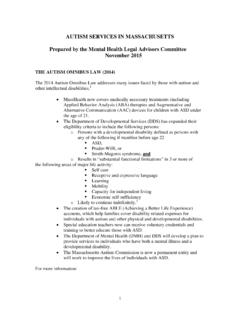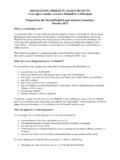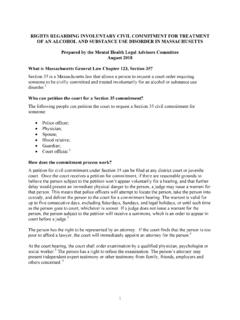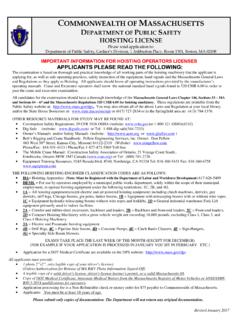Transcription of YOUR RIGHTS REGARDING - MHLAC
1 1 your RIGHTS REGARDING ADMISSION TO AND DISCHARGE FROM A HOSPITAL UNDER massachusetts MENTAL HEALTH LAW Prepared by the Mental Health Legal Advisors Committee January 2016 massachusetts General Laws Chapter 123, the massachusetts mental health statute, provides individuals with certain RIGHTS REGARDING admission to and discharge from a general or psychiatric your RIGHTS REGARDING admission and discharge depend on your legal status. If you are at a hospital, you can ask staff for information about your status. The paperwork stating your legal status is kept in your medical record. There are three possible legal statuses: section 12; voluntary admission; conditional voluntary admission.
2 EMERGENCY ADMISSIONS: SECTION 12 OF MASS. GEN. LAWS CHAPTER 123 Special rules apply to individuals under age 16 and individuals ages 16 & 17. These rules are discussed in later sections of this flyer. What is a Section 12? In massachusetts , Section 12 of Chapter 123 of the massachusetts General Laws controls the admission of an individual to a general or psychiatric hospital for psychiatric evaluation and, potentially, treatment. Section 12(a) allows for an individual to be brought against his or her will to such a hospital for evaluation. Section 12(b) allows for an individual to be admitted to a psychiatric unit for up to three business days against the individual s will or without the individual s consent.
3 Practical advice: Both the Section 12(a) and Section 12(b) are documented on the same standard form, an Application for an Authorization of Temporary Involuntary Hospitalization. 2 Practical advice: Both the transport to the facility and initial psychiatric evaluation and the admission for up to three days are commonly referred to as being Section 12 d or pink papered, the latter because the form may be printed on pink paper. Who can sign a Section 12(a) application? Pursuant to Section 12(a), a physician, nurse practitioner,3 qualified psychiatric nurse, qualified psychologist, licensed independent clinical social worker, or police officer 2 may apply to admit anyone to a facility if he or she believes that, without hospitalization, the person meets the standard for admission.
4 What is the standard for an application for admission under Section 12(a)? The standard is whether the individual would "create a likelihood of serious harm by reason of mental illness."4 "Likelihood of serious harm" means one of three things: The person poses a substantial risk of physical harm to him/herself as manifested by evidence, threats of, or attempts at suicide or serious bodily injury; or The person poses a substantial risk of physical harm to others as evidenced by homicidal or violent behavior or evidence that others are in reasonable fear of violent behavior and serious physical harm from that person; or The person s judgment is so affected that there is a very substantial risk that the person cannot protect himself or herself from physical impairment or injury, and no reasonable provision to protect against this risk is available in the What if examination is not possible?
5 If an examination of the individual is not possible because of the emergency nature of the case and because the person refuses to consent to such examination, then a doctor, qualified psychologist, licensed independent clinical social worker, or psychiatric nurse can sign the Application for an Authorization of Temporary Involuntary This provision may mean that the person signing the application has not seen the individual subject to the application. The clinician may rely instead on whatever facts and circumstances have come to his or her If none of those four medical professionals is available, then a police officer is allowed to make the Since the law does not say what "facts or circumstances" might be considered relevant, a mental health clinician may have considerable leeway in making the decision.
6 For example, a clinician might rely on facts learned from a 911 call from another person or from a family member s call to a doctor giving his or her version of the events. What happens after admission? Following this procedure, an individual may be admitted to a psychiatric facility without a court hearing and against his or her will for up to three business days, provided that a physician designated by the hospital has examined the person and signed the admission If the paper is signed by a physician who is not designated by the hospital, by a qualified psychologist, by a licensed independent clinical social worker, by a qualified psychiatric nurse, or by a police officer, it is considered only an application for hospitalization.
7 A designated physician at the facility must still actually examine and admit the The examination must occur within two hours of reception at the 3 Saturdays, Sundays and legal holidays are excluded from the computation of the three Can one have a lawyer appointed? At the time of admission, the hospital must inform each individual that the facility will, upon the person's request, notify the state public defender agency, the Committee for Public Counsel Services (CPCS), of the The hospital will present the individual with a form asking if he or she would like the hospital to contact In those cases in which the hospital notifies CPCS, CPCS will "forthwith" appoint an attorney to meet with and, unless the person voluntarily and knowingly declines assistance, represent the Practical Advice: Ask staff to use a phone to call an attorney yourself if possible.
8 Additionally, if the confined person believes that "an abuse or misuse" of the admission process has occurred, the person or his or her counsel may seek emergency judicial review in district Unless the individual seeks a delay, the hearing must be held no later than the next business day after the request for the What can the hospital do during these first three days? At any time during these three business days, the hospital may: discharge the individual if the hospital determines that he or she is not in need of care and treatment;18 or file a petition for involuntary commitment with the district What can an individual do during these first three days?
9 At any time during the three days, an individual may: apply to the hospital to change one s status to that of a conditional voluntary patient (an application which the hospital must accept);20 or seek emergency judicial review in the district court (discussed above). Practical advice: Always ask to speak to an attorney to discuss your legal options. Attorneys are available at the Committee for Public Counsel Services, the Mental Health Legal Advisors Committee and the Disability Law Center. VOLUNTARY ADMISSIONS If you admit yourself to a hospital as a voluntary patient, your status is totally voluntary and may be terminated by you or the hospital at any Nevertheless, the hospital may restrict your right to leave to normal working hours and weekdays.
10 Although the law allows for voluntary admissions, in practice hospitals rarely offer them. When facility staff persons describe a patient as "voluntary," typically they mean that the patient has "conditional voluntary" status. 4 CONDITIONAL VOLUNTARY ADMISSIONS (Section 10 & 11) If the hospital considers you competent to make the decision, you may apply for conditional voluntary admission There is a form to sign to apply for this As a conditional voluntary patient, you remain on this status, until the hospital decides to discharge you, you ask to leave by filing a "three day notice," or the hospital decides to pursue What happens when one considers signing into a hospital as a conditional voluntary patient?













